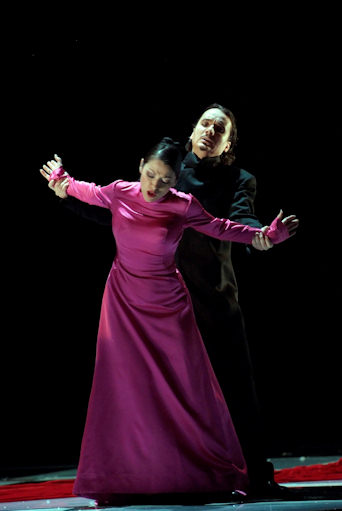Other Links
Editorial Board
- UK Editors
- Roger Jones and John Quinn
Editors for The Americas - Bruce Hodges and Jonathan Spencer Jones
European Editors - Bettina Mara and Jens F Laurson
Consulting Editor - Bill Kenny
Assistant Webmaster -Stan Metzger
Founder - Len Mullenger
Google Site Search
SEEN AND HEARD INTERNATIONAL OPERA REVIEW
Tchaikovsky, Eugene Onegin: Soloists, Orquestra de la Comunitat Valenciana, Cor de la Generalitat Valenciana. Conductor: Omer Meir Wellber. Palau de Les Arts de Valencia. 25.1.2011 (JMI)
Production from Warsaw’s Teatr Wielki
Direction: Mariusz Trelinski
Sets: Boris Kudlicka
Costumes: Joanna Klimas
Lighting: Felice Ross
Choreography: Emil Wesolowski
Cast:
Onegin: Artur Rucinski
Tatyana: Irina Mataeva
Lenski: Dmitri Korchak
Prince Gremin: Gunther Groissböck
Olga: Lena Belkina
Filipievna: Margarita Nekrasova
Madame Larina: Helene Schneiderman
Monsieur Triquet: Emilio Sánchez
Zaretski: Simon Lim
Captain: Aldo Heo
Madrid’s Teatro Real, Valencia’s Palau de les Arts, and Bilbao’s ABAO have all have Eugene Onegin on their programs, an opera that was absent from the programs for many years in the above-mentioned cities, but now seems to come back with a vengeance. Another commonality: All three stage productions come from Eastern Europe. Madrid’s from Russia, while two Polish directors will be responsible for the productions in Valencia and Bilbao.

Production Picture © Tato Baeza
Polish Mariusz Trelinski was back at Palau de Les Arts, after his attractive work in Madama Butterfly last season. This aesthetical production of Onegin follows a figurative and minimalist concept and suggests flash-backs of the protagonists, as if they were suffering a actual nightmares remembering what happened with their lives and their relationship. That would explain the presence of an old Onegin as a ghost à la A Christmas Carol. Following this dream-like concept, stage direction emphasizes the coldness in the relations between the different characters, with strange aspect of the people on stage and the profusion of mechanical movements. Only the duel scene is more traditional, and quite attractive to boot. Costumes are original, in unusual colours, much in line with the concept of the above mentioned nightmares. Felice Ross is the real protagonist of the production, with his magnificent lighting work... truly spectacular in the final act and the in Letter Scene. The cuts in the music were unusual and included the chorus of farmers in the first act, as well as the two Scott dances in act III.
Omer Meir Wellber was again on the podium of Palau de Les Arts , following his very successful debut in Aida last month. He confirmed the excellent impression he gave on his debut. No question it is a very wise decision from the part of the management of the house to ascertain the services of this young and exceptional talent for the next years to come. Mr. Wellber’s reading was always full of passion and strength, very much befitting this most romantic opera. A little more delicacy might have been a bonus here and there, as would have been a slightly more subtle brass section, but theses are only small details in an excellent musical performance. The Orchestra was up to the interpretive standards, playing at qualitative capacity, which is a very high level, indeed. We can expect great nights of music to come with this Orchestra and its conductor. All assuming the opera survives the financial crisis, of course.
Polish baritone Artur Rucinski gave life to Onegin with his fine, if not entirely convincing interpretation. He is a rather lyrical baritone, very well suited to the demands of the character, with a beautiful and well-pitched voice, although its projection needs improvement. I only found him a little short of power in the arioso that puts an end to the first scene of Act III, perhaps the most dramatic moment for the character.
Russian soprano Irina Mataeva successfully replaced Amanda Echalaz in the part of Tatiana. No doubt she is a near-ideal interpreter of the character: young and lithe and blessed with amazing stage skills. She is the Tatiana of any stage director dreams of. Vocally, she is a light soprano with a reduced middle range, gaining in volume in the high notes what she loses in quality. The Letter scene lacked emotion, but that blame may best be laid at the feet of the stage direction. Her final scene left little to be desired.
The young Russian tenor Dmitri Korchak (30) made for an excellent Lenski. His voice is not particularly beautiful and it can even be too light for the demands of the character, but he sang and acted with conviction at all times and he offered the best singing of the evening in the well-known aria "Kudà, Kudà,", a great moment in the whole performance.
Austrian bass Gunther Groissböck was a well suited Prince Gremin, although not particularly powerful at the bottom of the tessitura. Mezzo Lena Belkina replaced Anita Rachvelishvili and she offered a good dramatic performance accompanied by a pleasant voice. Best of all this lovely surprise amid the small roles: I have never heard the part of Filipievna sung so well as with Margarita Nekrasova.
